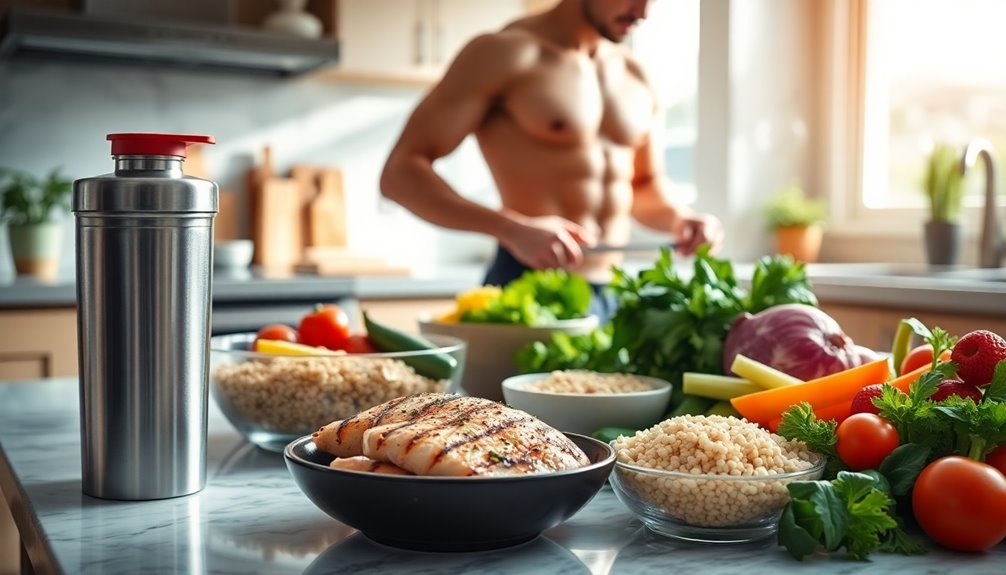Protein's important for your weight loss and muscle-building journey. It helps repair and grow muscle tissue while preventing muscle breakdown during calorie restrictions. By enhancing satiety, protein makes it easier to control your appetite and manage your calorie intake. Aim for 1.2 to 2.2 grams of protein per kilogram of body weight, spread evenly across meals. Include high-quality sources like lean meats, dairy, and legumes. Proper protein timing, such as consuming 20-30 grams every few hours, maximizes its benefits. If you want to uncover more strategies and insights, there's plenty more to explore!
Key Takeaways
- Protein supports muscle repair and growth, essential for effective weight loss and muscle building.
- It enhances satiety, helping control appetite and reduce overall calorie intake.
- Distributing protein intake throughout the day boosts metabolism and promotes muscle synthesis.
- High-quality protein sources, including lean meats and plant-based options, provide essential amino acids for recovery.
- Incorporating protein-rich snacks and meals aids in preventing muscle breakdown during weight loss.
What Is Protein?
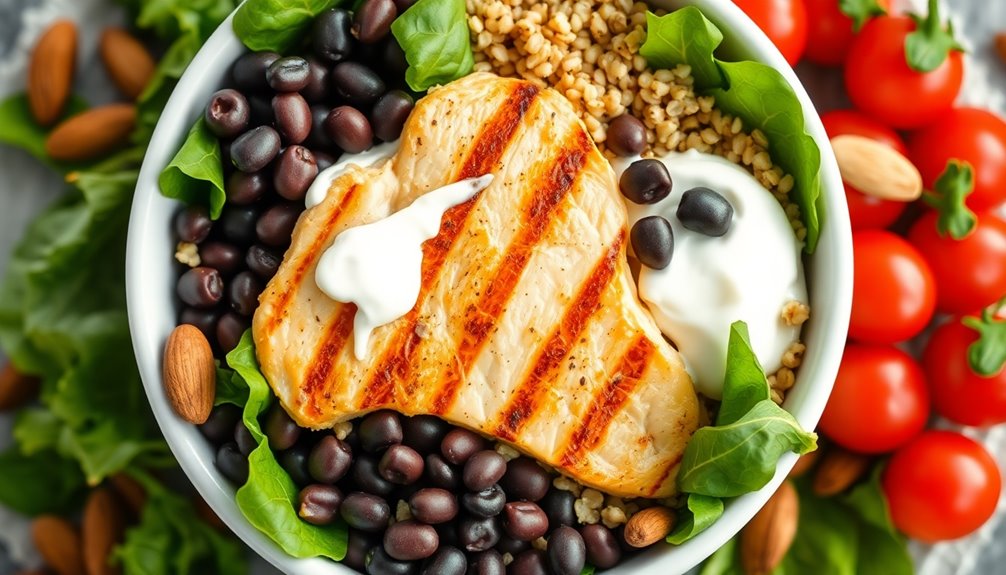
Protein is an essential macronutrient that plays a key role in your body's overall function and health. It's made up of amino acids, which are the building blocks of tissues, enzymes, and hormones. Your body relies on these amino acids for various processes, from repairing muscles after a workout to supporting immune function. Understanding protein benefits can help you make informed choices about your diet and overall well-being.
One of the primary protein benefits is its ability to promote muscle growth and repair. When you engage in physical activity, particularly resistance training, your muscles experience tiny tears that need protein to recover and grow stronger. Additionally, protein helps keep you feeling full longer, which can be beneficial for managing your appetite and maintaining a healthy weight.
As for protein sources, you have plenty of options to choose from, catering to various dietary preferences. Animal-based sources like lean meats, fish, eggs, and dairy products are rich in high-quality protein, providing all essential amino acids your body needs. If you prefer plant-based options, beans, lentils, tofu, quinoa, and nuts are excellent choices that offer protein without the saturated fats found in some animal products. Furthermore, incorporating whole food sources of protein into your meals can enhance your overall nutrient intake while ensuring you meet your protein requirements. Remember, making conscious choices about protein can contribute significantly to achieving your health and fitness goals.
How Protein Aids Weight Loss
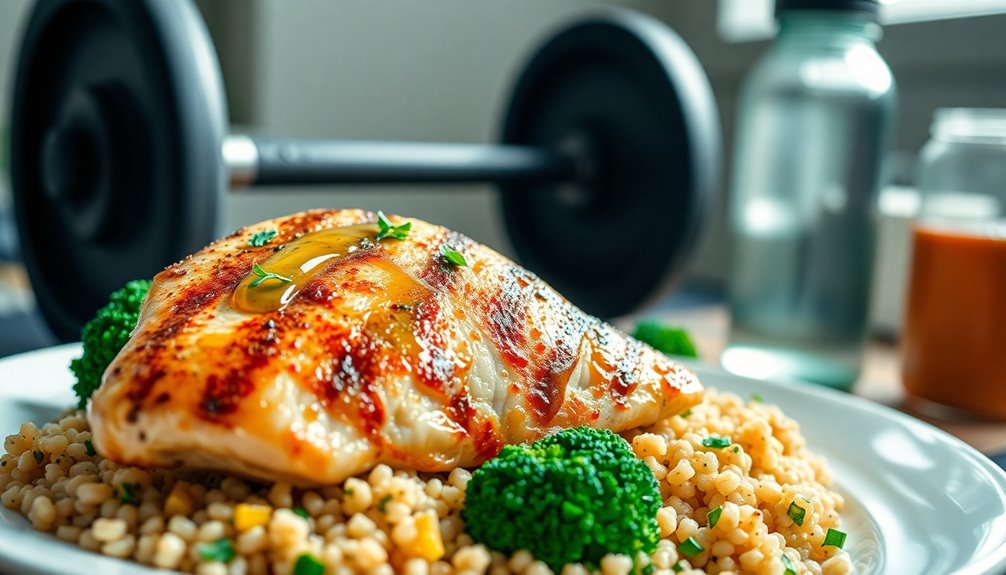
Including protein in your diet can greatly aid in weight loss by enhancing satiety and boosting your metabolism. When you consume protein, your body goes through a process called protein digestion, which requires more energy compared to digesting carbohydrates or fats. This increased energy expenditure can elevate your overall calorie burn, making it easier to shed those extra pounds.
Moreover, protein plays a pivotal role in stimulating feelings of fullness. When you eat protein-rich foods, they help regulate hormones responsible for hunger and satiety, such as ghrelin and leptin. By keeping these hormones in check, you're less likely to experience cravings or overeating, which is essential to successful weight loss.
Another important aspect is how protein metabolism works in your body. When you consume protein, it breaks down into amino acids, which are essential for many bodily functions. These amino acids can help maintain lean muscle mass, especially during a calorie deficit. Preserving muscle mass is vital because muscle tissue burns more calories at rest compared to fat tissue, further supporting your weight loss efforts.
Incorporating a variety of protein sources—such as lean meats, dairy, legumes, and nuts—into your meals not only supports weight loss but also helps create a sense of community around shared meals. Additionally, having access to online support community can enhance your weight loss journey by providing motivation and shared experiences. So, whether you're dining with friends or family, remember that protein can be your ally in achieving your weight loss goals while fostering meaningful connections.
Protein and Muscle Synthesis
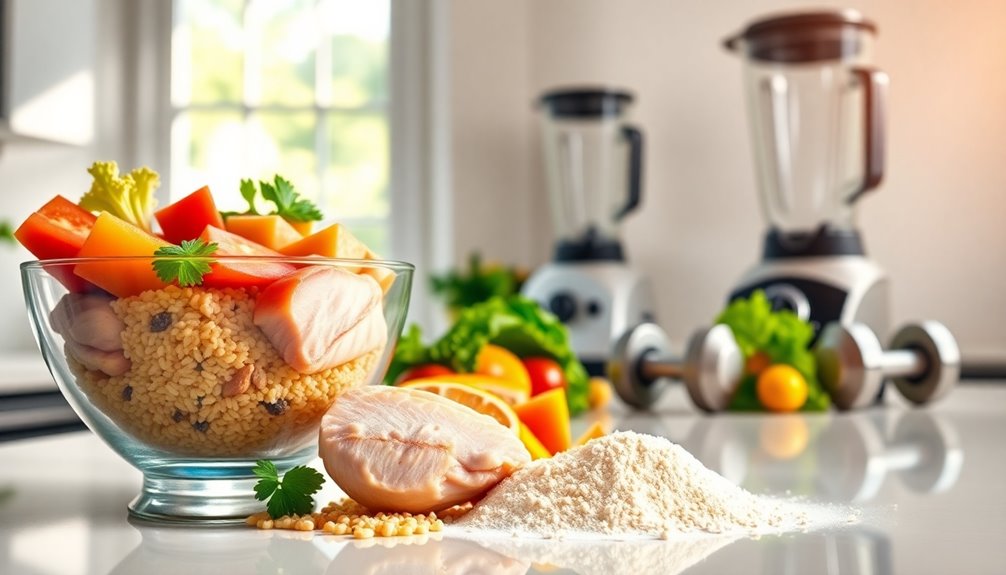
For anyone looking to build muscle, understanding the role of protein in muscle synthesis is fundamental. Protein plays a vital part in the protein synthesis process, which is the mechanism through which your body repairs and builds muscle fibers after exercise. This process not only helps you gain muscle mass but also enhances your overall strength and performance.
When you engage in resistance training, tiny tears occur in your muscle fibers. It's during the protein synthesis process that your body repairs these tears, leading to muscle growth. Here are some key benefits of protein regarding muscle repair:
- Supports muscle recovery: Protein helps repair damaged tissues after workouts.
- Stimulates muscle growth: Adequate protein intake promotes hypertrophy, increasing muscle size.
- Enhances strength: Improved muscle recovery leads to better performance in future workouts.
- Prevents muscle breakdown: Sufficient protein intake can help minimize muscle loss during weight loss.
- Boosts metabolism: Muscle tissue burns more calories at rest, aiding in weight management.
To reap the muscle repair benefits, aim for high-quality protein sources, including lean meats, dairy, legumes, and plant-based options. Consuming protein shortly after your workouts can optimize muscle repair and growth, so consider making it a part of your post-exercise routine. Additionally, research from the Garvan Institute of Medical Research highlights the importance of protein in overall health and metabolic function. Remember, protein isn't just a dietary choice; it's an essential component in your journey to achieving your fitness goals.
Daily Protein Requirements
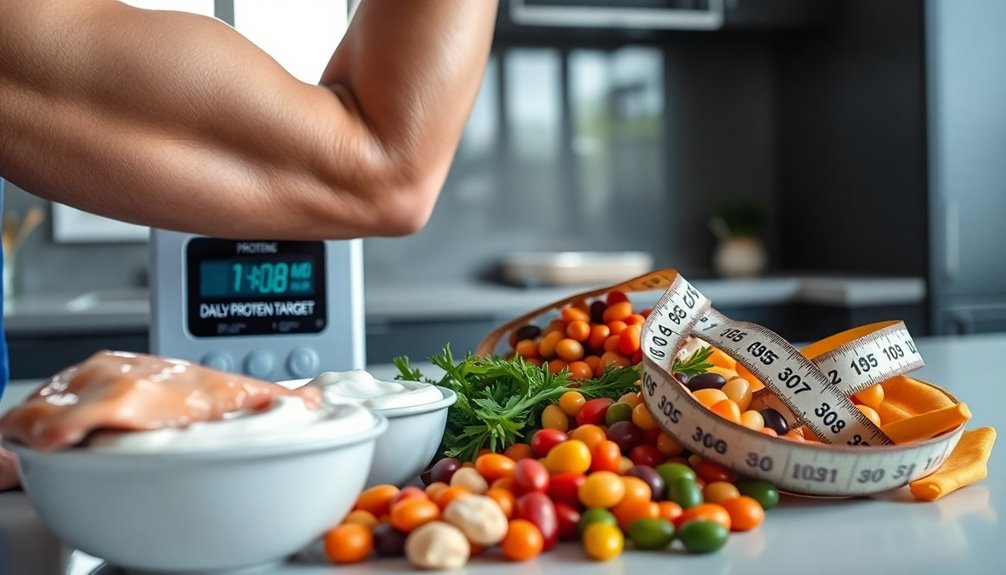
Determining your daily protein requirements is vital for optimizing muscle growth and weight loss. The general guideline is to consume between 1.2 to 2.2 grams of protein per kilogram of body weight, depending on your activity level and fitness goals. If you're looking to build muscle, aim for the higher end of that range, while those focusing on weight loss can benefit from the lower end.
One common protein myth is that you need to consume a massive amount of protein in one sitting to see benefits. In reality, protein timing is just as essential as the total amount you consume throughout the day. Spreading your protein intake over multiple meals helps maximize muscle protein synthesis and aids in recovery.
Aim to distribute your protein evenly across 3 to 5 meals, with each meal containing around 20 to 30 grams of high-quality protein. A balanced plant-based diet can also provide vital nutrients essential for muscle recovery and overall health.
It's also important to listen to your body. If you're feeling fatigued or not recovering well after workouts, consider adjusting your protein intake. Experiment with meal timing to see what works best for you; some people thrive on having a protein-rich snack post-workout, while others prefer a balanced meal.
Best Protein Sources
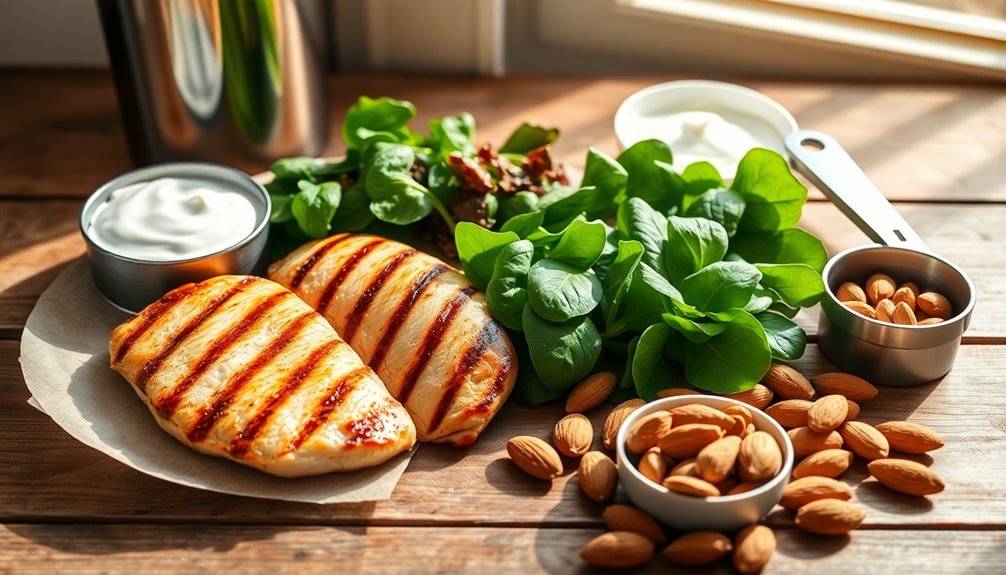
When it comes to selecting protein sources, you'll want to focus on options that not only support your muscle-building and weight-loss goals but also provide essential nutrients. The right protein sources can make a significant difference in your overall diet, helping you feel full longer and boosting your metabolism.
Here are some of the best protein sources to ponder:
- Lean meats: Chicken, turkey, and lean cuts of beef provide high-quality protein with minimal fat.
- Fish: Salmon, tuna, and other fatty fish are rich in omega-3 fatty acids, which are beneficial for heart health.
- Eggs: Packed with vitamins and minerals, whole eggs are an excellent source of protein and healthy fats.
- Dairy products: Greek yogurt and cottage cheese are great for muscle repair and are also rich in calcium.
- Protein shakes and bars: These can be convenient options for on-the-go nutrition, offering a quick protein boost when you need it most. Additionally, incorporating smoothies into your diet can help you achieve your weight loss goals while providing essential nutrients and satisfying flavors.
Incorporating a variety of these protein sources into your diet not only helps meet your daily requirements but also ensures you're receiving a broad spectrum of nutrients. Whether you're blending up a protein shake post-workout or grabbing a protein bar as a snack, you're making a smart choice that aligns with your health goals. Remember, balance is key, so mix and match these options to keep your meals interesting and satisfying.
Timing Your Protein Intake
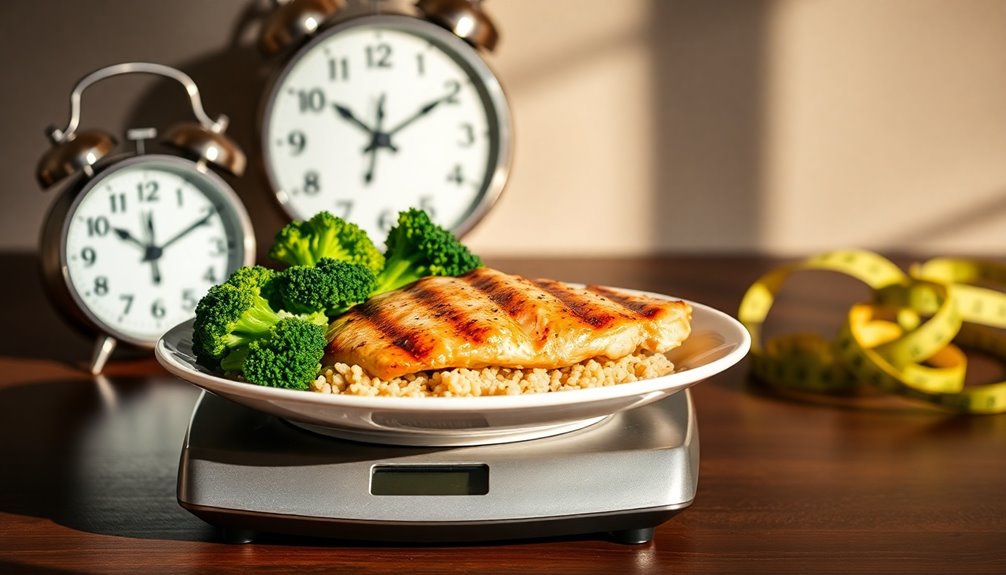
Effective protein timing can greatly enhance your weight loss and muscle-building efforts. To maximize your results, you need to focus on how you distribute your protein intake throughout the day. Research suggests that spreading your protein consumption in smaller, frequent meals can improve protein absorption, allowing your body to utilize nutrients more efficiently.
Instead of loading up on protein in just one or two meals, aim for 20-30 grams of high-quality protein every 3-4 hours. This approach not only supports muscle repair and growth but also helps to regulate appetite, keeping you satisfied and reducing the likelihood of unhealthy snacking.
When you time your protein intake around your workouts, you can also optimize recovery. Consuming protein shortly after exercising, ideally within a 30 to 60-minute window, can help stimulate muscle protein synthesis, which is essential for building strength and muscle. Additionally, incorporating glute-specific movements into your training can further enhance your muscle-building results.
Additionally, consider the quality of your protein sources. Incorporate a mix of animal and plant-based proteins to make sure you're getting a wide range of amino acids. This variety can further enhance your body's ability to absorb and utilize protein effectively.
Protein in Popular Diets
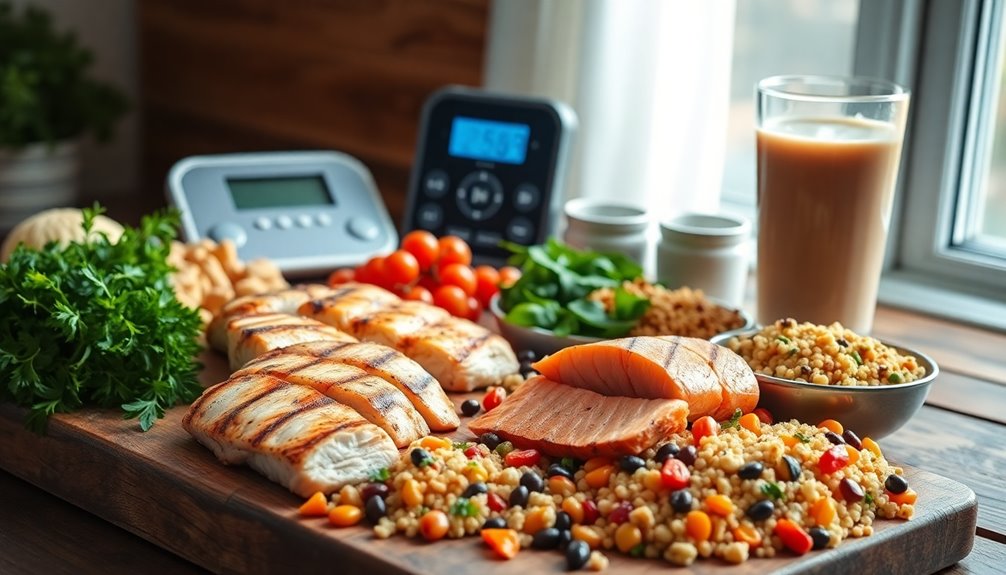
Many popular diets emphasize the importance of protein as a key component for achieving weight loss and muscle-building goals. By incorporating adequate protein into your meals, you can feel full longer, reduce cravings, and support muscle repair and growth. Whether you're following a low-carb plan or a high-protein regimen, you'll find various options that make protein a priority.
Many diets promote specific protein sources, including:
- Lean meats: Chicken, turkey, and fish are excellent for building muscle.
- Plant-based proteins: Lentils, beans, and tofu can provide essential nutrients and fiber.
- Protein shakes: Convenient and versatile, they can be a quick meal replacement or snack.
- Protein bars: Ideal for on-the-go, these can help curb hunger while adding protein to your day.
- Dairy products: Greek yogurt and cottage cheese are rich in protein and can be enjoyed in various ways.
In addition to supporting muscle growth, adequate protein intake is crucial for maintaining liver health, as fatty liver affects nearly 100 million people in North America. As you navigate through these diets, remember that the quality of protein matters. Whole food sources are generally more beneficial than processed options. Keep an eye on added sugars and unhealthy fats in protein bars and shakes. It's about finding what works best for your lifestyle while ensuring you get sufficient protein to meet your goals.
Ultimately, you want to feel good about your choices and enjoy the journey toward a healthier you. Embracing protein in your diet can build a supportive community around your goals, making it easier to stick to your plan.
Protein Supplements: Do You Need Them?
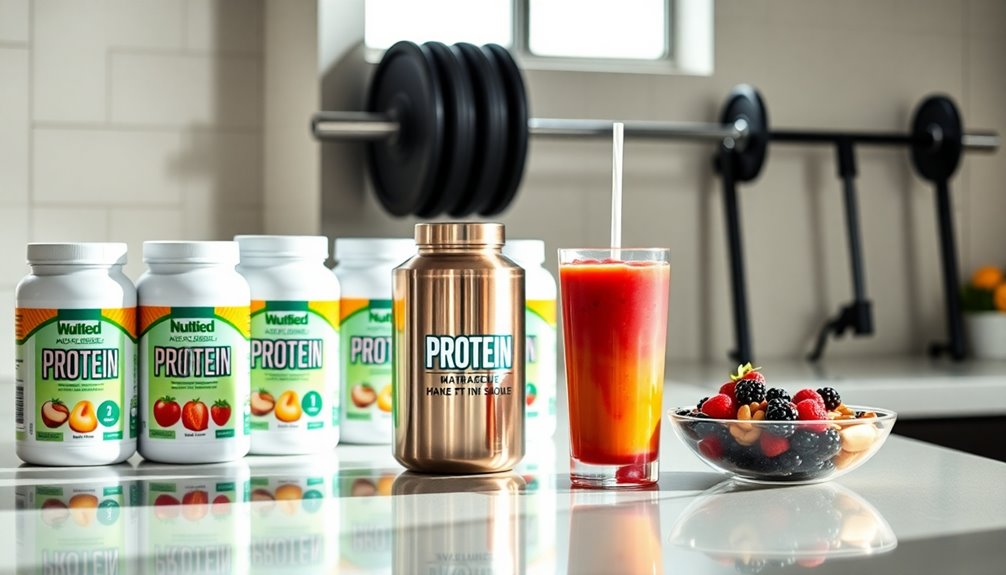
Protein supplements can be a valuable addition to your diet, especially if you find it challenging to meet your protein needs through whole foods alone. Many people struggle to hit their daily protein targets, particularly if they lead busy lifestyles or follow specific dietary restrictions. In such cases, protein shakes can serve as a convenient and effective way to boost your intake.
When considering protein supplements, it's important to assess your individual dietary needs. Are you an athlete looking to enhance muscle recovery? Or perhaps you're on a weight-loss journey and want to preserve lean muscle mass? Protein shakes can help you achieve these goals by providing a quick source of protein without excess calories. Additionally, it's essential to consider the potential long-term pain that may arise from neglecting a comprehensive approach to health.
However, it's crucial to remember that while supplements can help, they shouldn't replace whole foods entirely. Whole food sources offer additional nutrients like vitamins, minerals, and fiber, which are necessary for overall health. Striking a balance between whole foods and protein supplements can create a well-rounded diet that meets your nutritional requirements.
If you decide to incorporate protein shakes into your routine, choose high-quality products with minimal additives. Opt for options that align with your dietary preferences, whether that's whey, pea, or hemp protein. Ultimately, the key is to listen to your body and adjust your intake based on your activity level and personal goals. Embracing both whole foods and protein supplements can lead you to a healthier, more fulfilling lifestyle.
Common Myths About Protein
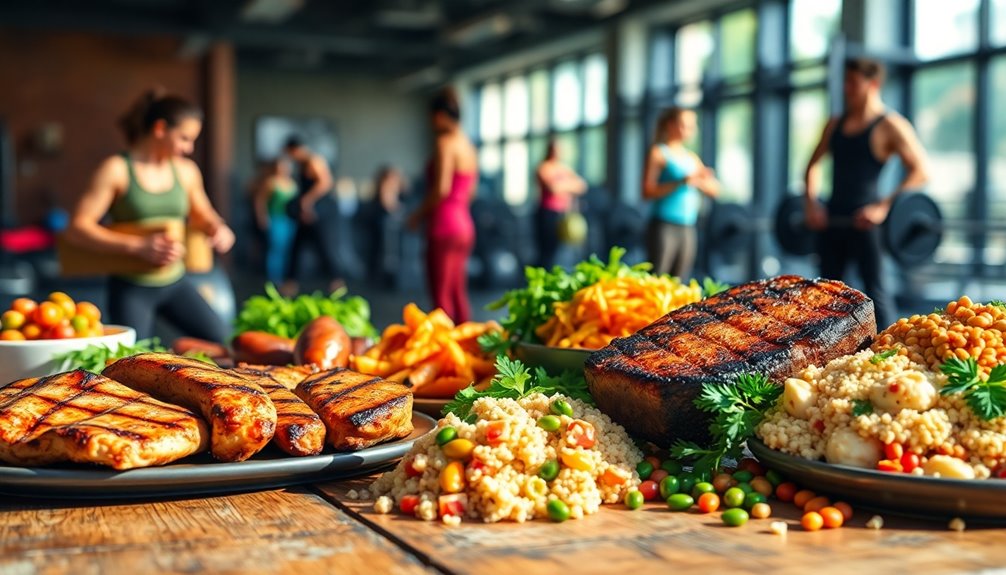
Misunderstandings surrounding protein can lead to confusion about its role in your diet. You might've heard various protein myths that can derail your nutrition goals. Let's debunk some of the most common misconceptions:
- More protein equals more muscle: While sufficient protein is vital for muscle building, it's not solely about quantity. Quality, in addition to resistance training, plays a significant role.
- Protein timing is crucial: Many believe you must consume protein immediately after a workout for optimal results. While timing can be helpful, overall daily intake is more significant.
- Not all protein sources are equivalent: Not all proteins offer the same benefits. Animal proteins typically contain all essential amino acids, while some plant sources may lack one or more.
- High-protein diets can be risky: When done correctly, high-protein diets can be safe and effective for weight loss and muscle gain. It's important to balance your diet with other nutrients.
- Getting sufficient protein from plants is possible: Plant-based diets can supply enough protein if you incorporate various sources, such as legumes, grains, and nuts. Additionally, consuming low-carb alternatives can help reduce cravings associated with high-carb foods.
Understanding these protein myths can empower you to make informed choices. Don't let misinformation hinder you from achieving your weight loss and muscle-building goals. By focusing on the right sources and amounts, you can guarantee that protein works for you, assisting you in feeling strong and supported on your journey.
Tips for Increasing Protein Intake
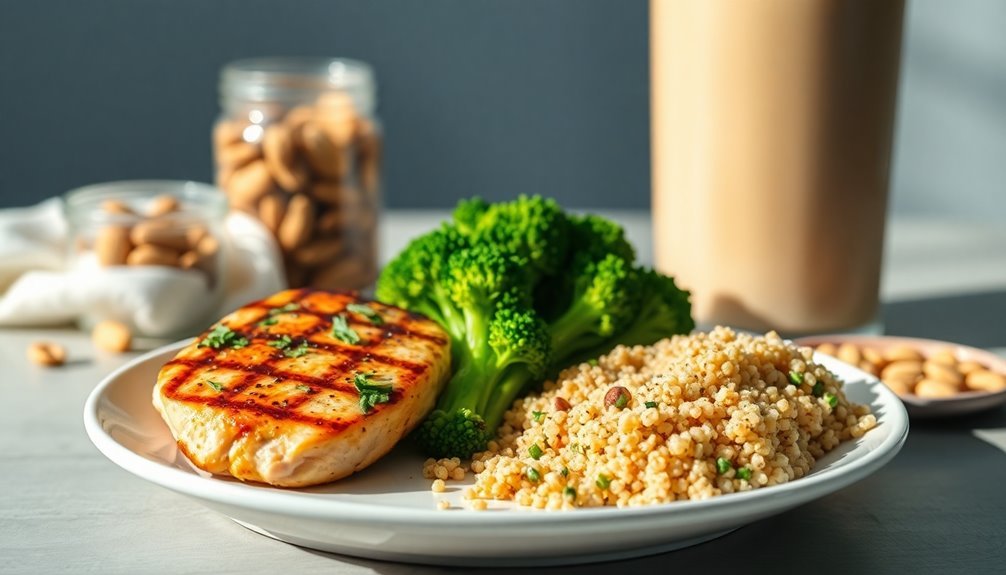
To reach your weight loss and muscle-building goals, incorporating more protein into your diet can be a game-changer. Here are some practical tips to help you boost your protein intake and make it a seamless part of your daily routine.
First, consider adding protein shakes to your post-workout regimen. They're an easy and convenient way to increase your protein consumption without feeling overwhelmed. Choose a high-quality protein powder that suits your dietary preferences, whether it's whey, plant-based, or other options. Mixing it with water or milk is simple, and you can even add fruits or greens for an extra nutrient punch.
Next, focus on high protein snacks throughout the day. Stock your pantry with options like Greek yogurt, cottage cheese, or protein bars. These snacks not only keep you satisfied but also help you reach your protein goals without much effort.
When you crave something crunchy, try roasted chickpeas or edamame.
Another effective strategy is to incorporate protein-rich foods into your main meals. Adding eggs, chicken, fish, or legumes to your salads and stir-fries can elevate the protein content significantly. Additionally, combining these meals with mini band workouts can enhance your muscle tone and strength.
Lastly, meal prep can be your best ally. Cook a batch of quinoa or grilled chicken at the start of the week, making it easy to add protein to any meal. By following these tips, you'll not only enhance your protein intake but also support your journey towards a healthier, stronger you.
Frequently Asked Questions
Can Protein Help Reduce Cravings and Appetite?
Yes, protein can definitely help reduce cravings and appetite. When you incorporate protein-rich snacks or protein supplements into your meals, you'll feel fuller for longer. This satiety helps curb unnecessary snacking and keeps your hunger in check.
Studies show that higher protein intake can lead to reduced ghrelin levels, the hormone responsible for hunger. So, by focusing on protein, you're not just boosting your nutrition, but also managing those pesky cravings effectively.
Is There a Difference Between Animal and Plant Protein?
Yes, there's a difference between animal and plant protein. Animal proteins typically offer complete amino acids, enhancing nutrient absorption and supporting muscle repair.
In contrast, plant proteins often lack one or more essential amino acids but can be combined for balance. Additionally, plant proteins tend to be easier on digestive health, providing fiber that aids digestion.
Choosing a mix can help you enjoy benefits from both sources while meeting your nutritional needs.
How Does Protein Affect Metabolism Rates?
Think of protein as fuel for your metabolism, igniting your body's engine. When you consume protein, it enhances protein synthesis, helping your body repair and build tissues. Additionally, it has a higher thermic effect than fats or carbs, meaning you burn more calories digesting it.
Can Excessive Protein Intake Be Harmful?
Yes, excessive protein intake can be harmful. Overloading your body with protein can lead to protein toxicity, which may strain your kidneys and liver. When you consume too much protein, your body struggles with protein digestion, causing waste buildup.
It's essential to find a balance that meets your needs without going overboard. Remember, moderation is key for maintaining overall health and well-being, so listen to your body's signals and adjust accordingly.
What Role Does Protein Play in Recovery After Workouts?
What's the secret to bouncing back after a workout? It's protein! You need it for muscle repair and growth, helping your body recover efficiently. When you consume protein post-exercise, it fuels your energy levels, enhancing your overall performance.
Conclusion
Incorporating enough protein into your diet is like fueling a high-performance engine; without the right fuel, you can't expect peak results. Research shows that higher protein intake can boost metabolism and help you shed pounds while building muscle. Just like a well-maintained car runs smoother, your body functions better when it's supported by sufficient protein. So, whether you're looking to lose weight or gain strength, prioritize protein to rev up your health journey and optimize your results.

